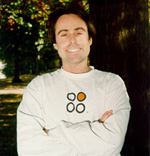Howie Choset

Contact info:
Email: choset [at] ri [dot] cmu [dot] edu
Office: (412) 268-2495
Lab: (412) 268-8407
Peggy (Assistant): (412) 268-7943
Howie Choset is a Professor of Robotics at Carnegie Mellon University where he serves as the co-director of the Biorobotics Lab and as director of the Robotics Major. He received his undergraduate degrees in Computer Science and Business from the University of Pennsylvania in 1990. Choset received his Masters and PhD from Caltech in 1991 and 1996. Choset's research group reduces complicated high-dimensional problems found in robotics to low-dimensional simpler ones for design, analysis, and planning. Motivated by applications in confined spaces, Choset has created a comprehensive program in modular, high DOF, and multi- robot systems, which has led to basic research in mechanism design, path planning, motion planning, and estimation. This work has been supported by both industry and government; DOD support includes two MURIs, one of which Choset was the CO-PI, a young investigator award, and multi-PI awards for modular systems. Choset.s group has produced over 60 journal papers (including 2 in Science and one in Proceedings of the National Academies of Sceince), 180 conference papers and 15 patents. Choset.s work has also been recognized by several best paper awards and nominations at ICRA, IROS and other robotics meetings. Choset's research program has made contributions to challenging and strategically significant problems in diverse areas such as surgery, manufacturing, infrastructure inspection, and search and rescue. In addition to publications, this work has led to Choset, along with his students, to form several companies including Medrobotics, for surgical systems, Hebi Robotics, for modular robots, and Bito Robotics for autonomous guided vehicles. Recently, Choset.s surgical snake robot cleared the FDA and has been in use in the US and Europe since. Choset also leads multi-PI projects centered on manufacturing: (1) automating the programming of robots for auto-body painting; (2) the development of mobile manipulators for agile and flexible fixture-free manufacturing of large structures in aerospace, and (3) the creation of a data-robot ecosystem for rapid manufacturing in the commercial electronics industry. This year, Choset co-lead the formation of the Advanced Robotics for Manufacturing Institute, which is $250MM national institute advancing both technology development and education for robotics in manufacturing. Finally, Choset is a founding Editor of the journal .Science Robotics. and is currently serving on the editorial board of IJRR.
In 2002 the MIT Technology Review elected Choset as one of its top 100 innovators in the world under 35. In 2014, Popular Science selected Choset's medical robotics work as the Best of What's New in Health Care. In 2005, MIT Press published a textbook, lead authored by Choset, entitled "Principles of Robot Motion." Finally, Choset's students have won best paper awards at the RIA in 1999 and ICRA in 2003; his group's work has been nominated for best papers at ICRA in 1997, IROS in 2003, 2007, and 2011, and CLAWAR in 2012; won best paper at IEEE Bio Rob in 2006, SSRR 2012 and 2015; won best video at ISMICS 2006 and ICRA 2011; and was nominated for best video in ICRA 2012.
"Nothing in the world can replace persistence. Talent will not; Nothing more common than the unsuccessful man with talent. Genius will not; unrewarded genius
is almost a proverb. Education will not; the world is full of educated derilicts. Persistence and Determination are omnipotent." -- Calvin Coolidge.
"We do not change as we grow older, we simply become more clearly ourselves." -- Unknown
Men have been at odds concerning the value of history. Some have studied earlier times in order to find a universal system of the world, in whose inevitable unfolding we can see the future as well as the past. Others have sought in the past prescriptions for success in the present. Thus, some believe that by studying scientific discovery in another day we can learn how to make discoveries. On the other hand, one sage observed that we learn nothing from history except that we never learn anything from history, and Henry Ford asserted that history is bunk. All of this is as far beyond me as it is beyond the scope of this book. I will, however, maintain that we can learn at least two things from the history of science. One of these is that many of the most general and powerful discoveries of science have arisen, not through the study of phenomena as they occur in nature, but, rather, through the study of phenomena in man-made devices, in products of technology, if you will. This is because the phenomena in man's machines are simplified and ordered in comparison with those occurring naturally, and it is these simplified phenomena that man understands most easily. Thus, the existence of the steam engine, in which phenomena involving heat, pressure, vaporization, and condensation occur in a simple and orderly fashion, gave tremendous impetus to the very powerful and general science of thermodynamics. We see this especially in the work of Carnot. Our knowledge of aerodynamics and hydrodynamics exists chiefly because airplanes and ships exist, not because of the existence of birds and fishes. Our knowledge of electricity came mainly not from the study of lightning, but from the study of man's artifacts.'', John Pierce
"It is not the critic who counts, nor the man who points out where the strong man stumbled, or where the doer of deeds could have done them better. The credit belongs to the man in the arena, whose face is marred by the dust and sweat and blood, who
strives valiantly, who errs, and who comes up short again and again, who knows the great enthusiasms, the great devotions; and spends himself in a worthy cause. The man who at best knows the triumph of high achievement, and who at worst, if he fails,
fails while daring greatly, so that his place will never be with those cold timid souls who never knew victory or defeat." -Theodore Roosevelt